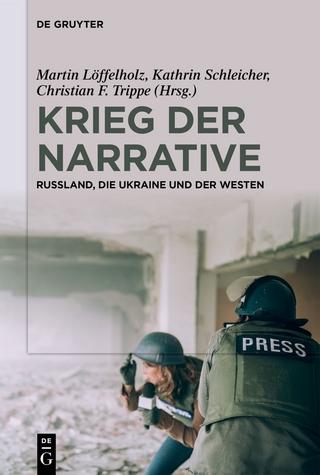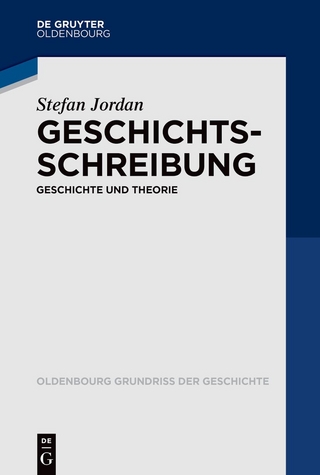
History and Theory
Pearson (Verlag)
978-0-13-615725-0 (ISBN)
Packages
Access codes for Pearson's MyLab & Mastering products may not be included when purchasing or renting from companies other than Pearson; check with the seller before completing your purchase.
Used or rental books
If you rent or purchase a used book with an access code, the access code may have been redeemed previously and you may have to purchase a new access code.
Access codes
Access codes that are purchased from sellers other than Pearson carry a higher risk of being either the wrong ISBN or a previously redeemed code. Check with the seller prior to purchase.
-- Explore how theory informs historical writing
Sharlene Sayegh received her Ph.D. in History and Critical Theory from the University of California, Irvine. She has taught in the Department of History at California State, Long Beach for over 14 years, where she also serves as the department's core curriculum coordinator. She is the University's Director of Program Review and Assessment, helping to guide the campus into best practices for student learning and engagement. A winner of the university's Distinguished Faculty Teaching Award as well as the World History Association's Teaching Prize, she remains committed to enhancing student learning and to sharing ideas about effective teaching with her colleagues. She is currently working on a micro history of women and business in eighteenth-century London. Eric Altice received his Ph.D. in History from UCLA and taught at California State University, Long Beach for several years. He is currently on the American History faculty for UCLA's Global Classroom/Social Science Education in Asia program in Nanjing, China.
In This Section:
I) Brief Table of Contents
II) Detailed Table of Contents
I) Brief Table of Contents
Chapter 1. The Importance of Theory in History
Chapter 2. Professionalization of History: Time and Science in the Historical Method
Chapter 3. Marxist History
Chapter 4. The Annales School
Chapter 5. The Transformation of Marxism—The New Left and Social History
Chapter 6. Environmental History
Chapter 7. Post-Structuralism and Deconstruction
Chapter 8. Cultural History
Chapter 9. Feminist and Gender History
Chapter 10. Subaltern Studies, Postcolonial Theory, and the History of Race and Nation
II) Detailed Table of Contents
Chapter 1. The Importance of Theory in History
Empiricism or Theory: Does It Have to Be an “either/or”?
Case Study: The History of Slavery
Text Goals and Chapter Organization
Your Reservoir of Knowledge—Just the Tip of the Iceberg
Endnotes
Chapter 2. Professionalization of History: Time and Science in the Historical Method
History from the Ancient World to the Enlightenment
From Enlightenment to Progressive History (18th–19th Centuries)
The Move to Objectivity, Professionalism, and Critiques of Progressive Histories
Endnotes
Chapter 3. Marxist History
Marxist and Materialist Philosophy in Historical Context
The Influence of Marx and Engels on Twentieth-Century Historical Writing
Conclusion
Thinking Like a Historian
Endnotes
Chapter 4. The Annales School
The First Generation—Bloch, Febvre, and “Histoire Totale”
The Second Generation—Fernand Braudel and the Waves of Time
The Third Generation—Le Roy Ladurie and Goubert: Making the Annales French
The Fourth Generation—Roger Chartier and the Rediscovery of Mentalités
Conclusion
Thinking Like a Historian
Endnotes
Chapter 5. The Transformation of Marxism—The New Left and Social History
The British New Left
The American New Left
Western-European Marxism
The Global New Left—Dependency Theory and World-Systems Theory
The Impact of the New Lefts: Social History
Conclusion
Thinking Like a Historian
Endnotes
Chapter 6. Environmental History
Natural History Through the Frontier Thesis and the Longue Durée: Roots of Environmental History
Approaching the Environment—Material or Cultural?
A Global Environmental History
Conclusion
Thinking Like a Historian
Endnotes
Chapter 7. Post-Structuralism and Deconstruction
Modernism and Structuralism
Postmodernism
Post-Structuralism
Deconstruction
A Conclusion—Influences on the Profession
Thinking Like a Historian
Endnotes
Chapter 8. Cultural History
Interdisciplinary Origins
Early Historical Studies of Culture
The ‘Linguistic Turn’
Defining the History of Culture—Some Conclusions
Thinking Like a Historian
Endnotes
Chapter 9. Feminist and Gender History
Feminism—A Political Movement
From Women’s History to Feminist History
Gender Theory and History
Queer Theory
Conclusion
Thinking Like a Historian
Endnotes
Chapter 10. Subaltern Studies, Postcolonial Theory, and the History of Race and Nation
Europe and the New Imperialism
Postcolonial Theory
Subaltern Studies
Theories and Histories of Race and Nation
Conclusion
Thinking Like a Historian
Endnotes
Glossary
Further Reading
Index
| Erscheint lt. Verlag | 13.1.2014 |
|---|---|
| Sprache | englisch |
| Maße | 216 x 276 mm |
| Gewicht | 410 g |
| Themenwelt | Schulbuch / Wörterbuch |
| Geisteswissenschaften ► Geschichte ► Geschichtstheorie / Historik | |
| Sozialwissenschaften ► Pädagogik | |
| ISBN-10 | 0-13-615725-4 / 0136157254 |
| ISBN-13 | 978-0-13-615725-0 / 9780136157250 |
| Zustand | Neuware |
| Haben Sie eine Frage zum Produkt? |
aus dem Bereich


